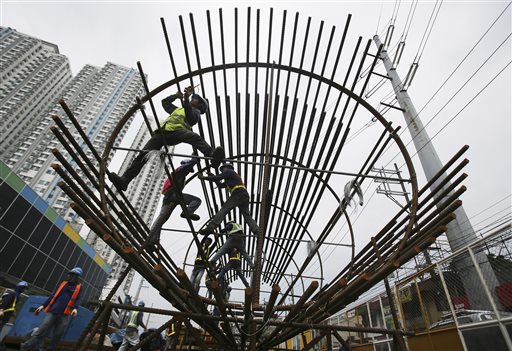PH remains attractive to foreign MNCs

In this Aug. 12, 2015, photo, Filipino workers arrange metal rods at a government road project in suburban Quezon City. AP PHOTO/AARON FAVILA
Notwithstanding seasonal jitters over the 2016 presidential elections, the Philippine growth and demographics story remains appealing to multinational giants seeking expansion opportunities amid a lackluster global economic backdrop, according to the global head of Citigroup’s multinational corporation business.
London-based Marc Merlino, global head of Citi’s global subsidiaries group, said in a recent interview with the Inquirer that in a period of slowing global growth, the Philippines offered ‘quite a good story’ that, in turn, was attracting a lot of multinational corporations (MNCs).
‘As the rest of the world struggles with growth, I think the relative attractiveness of the Philippines growing at 5-6 percent is quite strong,’ Merlino said, also noting the nation’s 100-million people and consumption-driven economy. ‘Companies that are looking to tap in and benefit from that growth are certainly very focused on establishing and expanding their presence in the Philippines.’
‘MNCs look at the business on a global basis and so there’s absolute value and relative value. If there are uncertainties on events like the elections, I think those are mitigated by the attractiveness of the underlying business proposition,’ Merlino said.
However, a European financial institution presents a differing view. French corporate and investment bank Natixis said that while increasing labor costs were driving manufacturers away from China to neighboring Asean countries, the Philippines was not as attractive in terms of ease of doing business and infrastructure as Thailand and Vietnam.
The Philippines grew its economy by an average 6.3 percent in the last five years of the Aquino administration and achieved a sovereign investment-grade rating from all three major global credit-rating agencies. On May 2016, the nation is set to elect a new president.
Merlino, who has worked for Citi’s corporate and investment banking business across Europe, US and Asia for the last 27 years, said MNCs typically look for the basic stuff when considering to invest in a particular market. These include the size of the market, growth prospects, educational system and the legal system, particularly on whether there was a reliable court system in place to resolve potential disputes.
Article continues after this advertisementAsked about restrictions to foreign ownership in certain areas of the economy in the Philippines, Merlino said the country was not unique in some of those requirements. ‘But I think there’s an opportunity to streamline and there’s always a balance between wanting to preserve the country and the history of the country and some of the important agendas that they have versus allowing all the multinational companies to come in and dominate certain segments of it,’ he said.
In the case of Citi’s MNC clients, he said majority of them already had an existing road map in the Philippines and were now ‘focused on incremental investment and expansion.’
Martin Mihov, Philippine head of global subsidiaries group, said the Philippines continued to enjoy a strategic advantage in the business process outsourcing (BPO) space, noting the Filipinos’ English proficiency and ‘general predisposition’ or attitude in dealing with other people.
In the case of Citi itself, bulk of the American banking giant’s more than 7,000 headcount in the Philippines are focused on the BPO segment. It is likewise the first company to incorporate a call center unit in this market.
Outside of BPO and the knowledge space, Mihov also noted that a number of Citi clients were expanding across the industrial space such as consumer or technology.
To attract a bigger share of foreign direct investments, Merlino said the Philippines would need to address infrastructure challenges, partly arising from the country’s archipelagic geography of having more than 7,000 islands, which are seen to create greater challenges on connectivity.
Merlino, whose team handles almost 1,000 people in about 100 countries dedicated to the subsidiaries of the world’s leading MNCs, also noted that while traditional MNCs were born in Europe, US and Japan, there was now a new generation of emerging market champions coming out of Asia. China and India, being the two biggest economies in the region, were the countries producing a new breed of Asian MNCs, although several of these were likewise coming from Southeast Asian markets like Thailand or the Philippines. As such, he noted that investment flow was becoming a ‘two-way street.’